Sustainable and Responsible Tourism Management Analysis Report
VerifiedAdded on 2022/12/15
|11
|3273
|348
Report
AI Summary
This report delves into the realm of sustainable and responsible tourism management, examining key concepts, theories, and principles within the context of Visit Britain. It evaluates the economic, social, and environmental impacts of tourism destinations, emphasizing the importance of balancing consumer demands with community and environmental needs. The report synthesizes knowledge on sustainable management in tourism organizations, exploring practices such as eco-friendly resource utilization and waste reduction. Case studies are analyzed to illustrate the application of sustainable business practices. Furthermore, it investigates innovative approaches to managing tourism destinations responsibly, including minimizing adverse impacts while optimizing economic, social, and environmental benefits. The report covers sustainability concepts in tourism operations and carbon footprint, and the practices of sustainable tourism development and management.
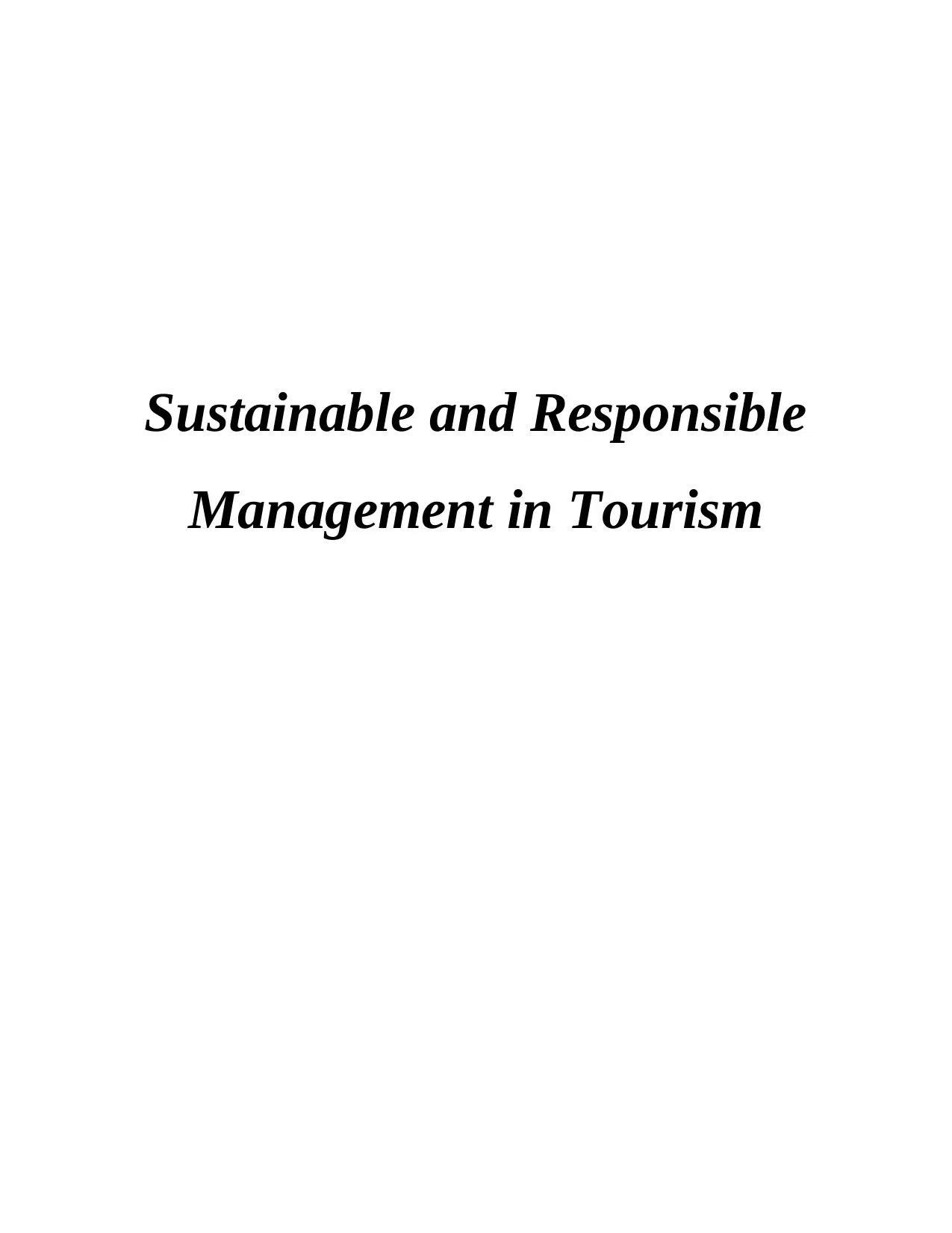
Sustainable and Responsible
Management in Tourism
Management in Tourism
Paraphrase This Document
Need a fresh take? Get an instant paraphrase of this document with our AI Paraphraser
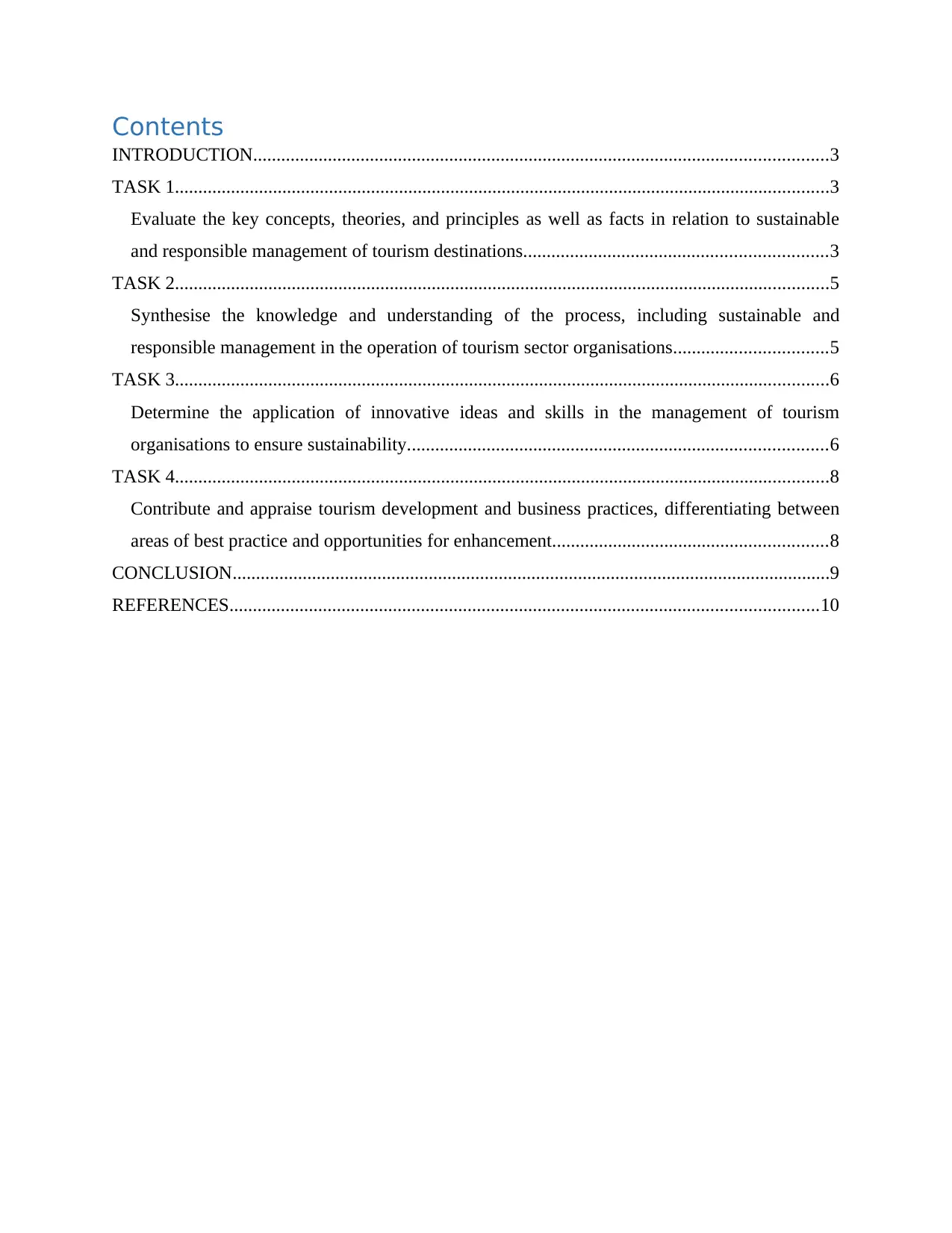
Contents
INTRODUCTION...........................................................................................................................3
TASK 1............................................................................................................................................3
Evaluate the key concepts, theories, and principles as well as facts in relation to sustainable
and responsible management of tourism destinations.................................................................3
TASK 2............................................................................................................................................5
Synthesise the knowledge and understanding of the process, including sustainable and
responsible management in the operation of tourism sector organisations.................................5
TASK 3............................................................................................................................................6
Determine the application of innovative ideas and skills in the management of tourism
organisations to ensure sustainability..........................................................................................6
TASK 4............................................................................................................................................8
Contribute and appraise tourism development and business practices, differentiating between
areas of best practice and opportunities for enhancement...........................................................8
CONCLUSION................................................................................................................................9
REFERENCES..............................................................................................................................10
INTRODUCTION...........................................................................................................................3
TASK 1............................................................................................................................................3
Evaluate the key concepts, theories, and principles as well as facts in relation to sustainable
and responsible management of tourism destinations.................................................................3
TASK 2............................................................................................................................................5
Synthesise the knowledge and understanding of the process, including sustainable and
responsible management in the operation of tourism sector organisations.................................5
TASK 3............................................................................................................................................6
Determine the application of innovative ideas and skills in the management of tourism
organisations to ensure sustainability..........................................................................................6
TASK 4............................................................................................................................................8
Contribute and appraise tourism development and business practices, differentiating between
areas of best practice and opportunities for enhancement...........................................................8
CONCLUSION................................................................................................................................9
REFERENCES..............................................................................................................................10
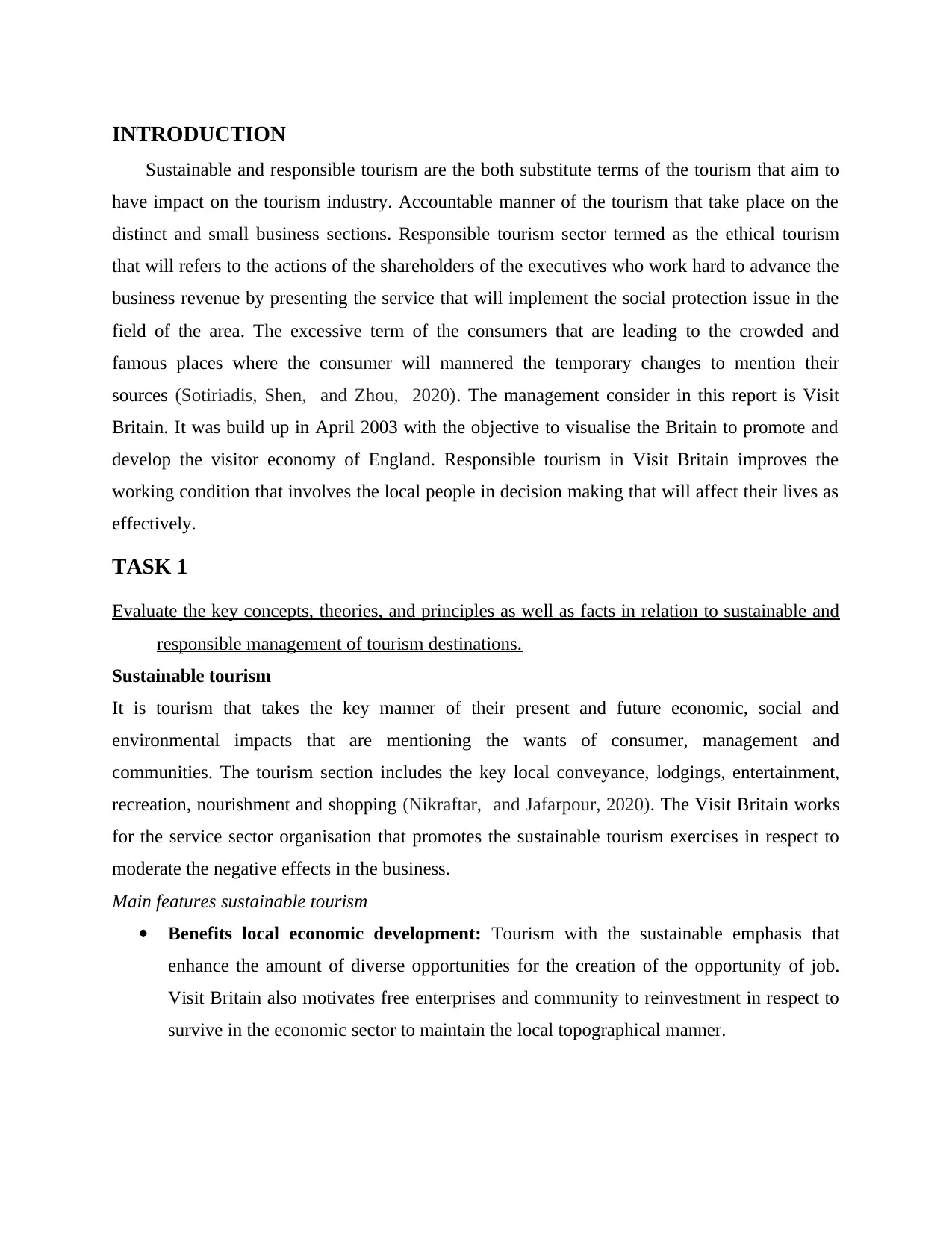
INTRODUCTION
Sustainable and responsible tourism are the both substitute terms of the tourism that aim to
have impact on the tourism industry. Accountable manner of the tourism that take place on the
distinct and small business sections. Responsible tourism sector termed as the ethical tourism
that will refers to the actions of the shareholders of the executives who work hard to advance the
business revenue by presenting the service that will implement the social protection issue in the
field of the area. The excessive term of the consumers that are leading to the crowded and
famous places where the consumer will mannered the temporary changes to mention their
sources (Sotiriadis, Shen, and Zhou, 2020). The management consider in this report is Visit
Britain. It was build up in April 2003 with the objective to visualise the Britain to promote and
develop the visitor economy of England. Responsible tourism in Visit Britain improves the
working condition that involves the local people in decision making that will affect their lives as
effectively.
TASK 1
Evaluate the key concepts, theories, and principles as well as facts in relation to sustainable and
responsible management of tourism destinations.
Sustainable tourism
It is tourism that takes the key manner of their present and future economic, social and
environmental impacts that are mentioning the wants of consumer, management and
communities. The tourism section includes the key local conveyance, lodgings, entertainment,
recreation, nourishment and shopping (Nikraftar, and Jafarpour, 2020). The Visit Britain works
for the service sector organisation that promotes the sustainable tourism exercises in respect to
moderate the negative effects in the business.
Main features sustainable tourism
Benefits local economic development: Tourism with the sustainable emphasis that
enhance the amount of diverse opportunities for the creation of the opportunity of job.
Visit Britain also motivates free enterprises and community to reinvestment in respect to
survive in the economic sector to maintain the local topographical manner.
Sustainable and responsible tourism are the both substitute terms of the tourism that aim to
have impact on the tourism industry. Accountable manner of the tourism that take place on the
distinct and small business sections. Responsible tourism sector termed as the ethical tourism
that will refers to the actions of the shareholders of the executives who work hard to advance the
business revenue by presenting the service that will implement the social protection issue in the
field of the area. The excessive term of the consumers that are leading to the crowded and
famous places where the consumer will mannered the temporary changes to mention their
sources (Sotiriadis, Shen, and Zhou, 2020). The management consider in this report is Visit
Britain. It was build up in April 2003 with the objective to visualise the Britain to promote and
develop the visitor economy of England. Responsible tourism in Visit Britain improves the
working condition that involves the local people in decision making that will affect their lives as
effectively.
TASK 1
Evaluate the key concepts, theories, and principles as well as facts in relation to sustainable and
responsible management of tourism destinations.
Sustainable tourism
It is tourism that takes the key manner of their present and future economic, social and
environmental impacts that are mentioning the wants of consumer, management and
communities. The tourism section includes the key local conveyance, lodgings, entertainment,
recreation, nourishment and shopping (Nikraftar, and Jafarpour, 2020). The Visit Britain works
for the service sector organisation that promotes the sustainable tourism exercises in respect to
moderate the negative effects in the business.
Main features sustainable tourism
Benefits local economic development: Tourism with the sustainable emphasis that
enhance the amount of diverse opportunities for the creation of the opportunity of job.
Visit Britain also motivates free enterprises and community to reinvestment in respect to
survive in the economic sector to maintain the local topographical manner.
⊘ This is a preview!⊘
Do you want full access?
Subscribe today to unlock all pages.

Trusted by 1+ million students worldwide
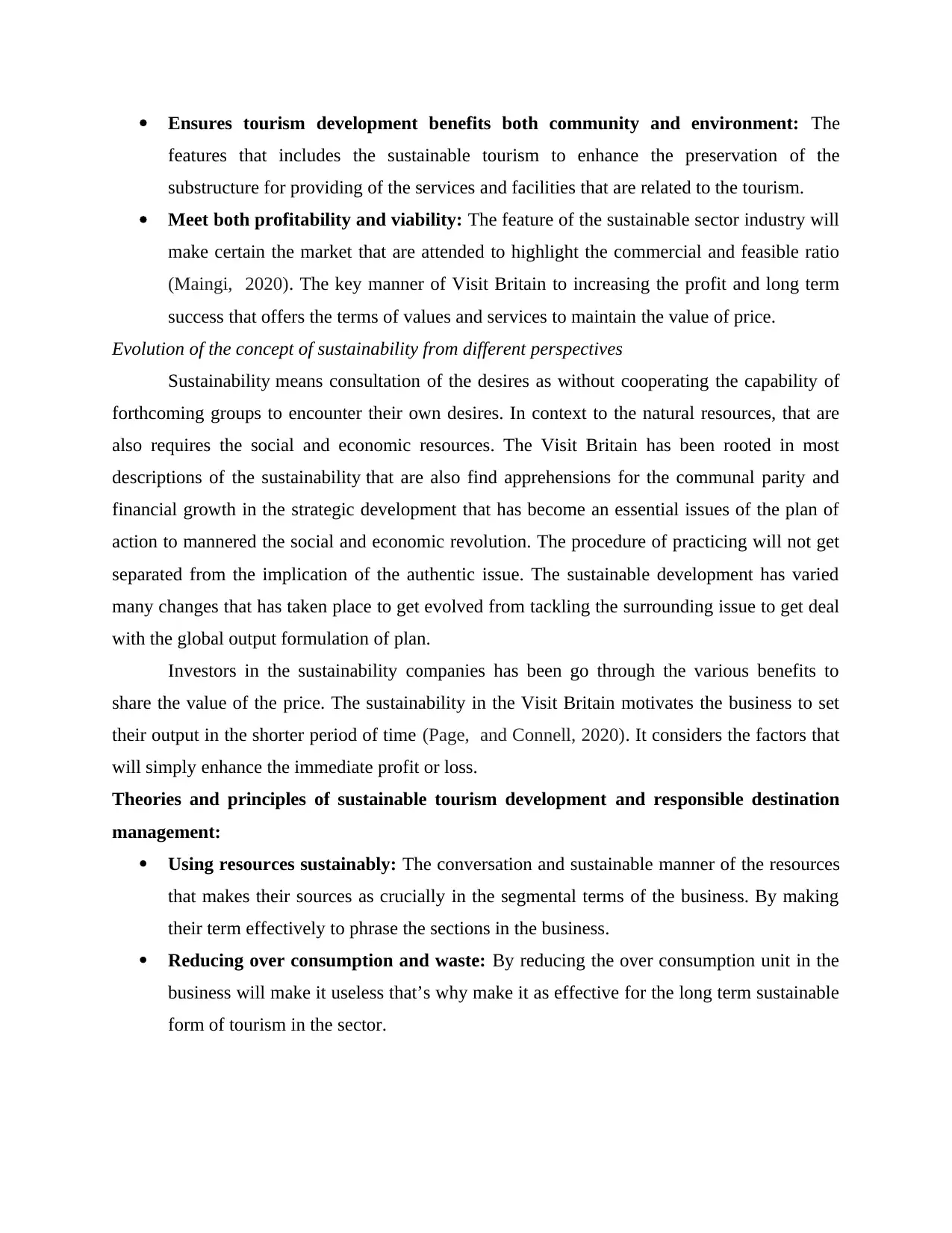
Ensures tourism development benefits both community and environment: The
features that includes the sustainable tourism to enhance the preservation of the
substructure for providing of the services and facilities that are related to the tourism.
Meet both profitability and viability: The feature of the sustainable sector industry will
make certain the market that are attended to highlight the commercial and feasible ratio
(Maingi, 2020). The key manner of Visit Britain to increasing the profit and long term
success that offers the terms of values and services to maintain the value of price.
Evolution of the concept of sustainability from different perspectives
Sustainability means consultation of the desires as without cooperating the capability of
forthcoming groups to encounter their own desires. In context to the natural resources, that are
also requires the social and economic resources. The Visit Britain has been rooted in most
descriptions of the sustainability that are also find apprehensions for the communal parity and
financial growth in the strategic development that has become an essential issues of the plan of
action to mannered the social and economic revolution. The procedure of practicing will not get
separated from the implication of the authentic issue. The sustainable development has varied
many changes that has taken place to get evolved from tackling the surrounding issue to get deal
with the global output formulation of plan.
Investors in the sustainability companies has been go through the various benefits to
share the value of the price. The sustainability in the Visit Britain motivates the business to set
their output in the shorter period of time (Page, and Connell, 2020). It considers the factors that
will simply enhance the immediate profit or loss.
Theories and principles of sustainable tourism development and responsible destination
management:
Using resources sustainably: The conversation and sustainable manner of the resources
that makes their sources as crucially in the segmental terms of the business. By making
their term effectively to phrase the sections in the business.
Reducing over consumption and waste: By reducing the over consumption unit in the
business will make it useless that’s why make it as effective for the long term sustainable
form of tourism in the sector.
features that includes the sustainable tourism to enhance the preservation of the
substructure for providing of the services and facilities that are related to the tourism.
Meet both profitability and viability: The feature of the sustainable sector industry will
make certain the market that are attended to highlight the commercial and feasible ratio
(Maingi, 2020). The key manner of Visit Britain to increasing the profit and long term
success that offers the terms of values and services to maintain the value of price.
Evolution of the concept of sustainability from different perspectives
Sustainability means consultation of the desires as without cooperating the capability of
forthcoming groups to encounter their own desires. In context to the natural resources, that are
also requires the social and economic resources. The Visit Britain has been rooted in most
descriptions of the sustainability that are also find apprehensions for the communal parity and
financial growth in the strategic development that has become an essential issues of the plan of
action to mannered the social and economic revolution. The procedure of practicing will not get
separated from the implication of the authentic issue. The sustainable development has varied
many changes that has taken place to get evolved from tackling the surrounding issue to get deal
with the global output formulation of plan.
Investors in the sustainability companies has been go through the various benefits to
share the value of the price. The sustainability in the Visit Britain motivates the business to set
their output in the shorter period of time (Page, and Connell, 2020). It considers the factors that
will simply enhance the immediate profit or loss.
Theories and principles of sustainable tourism development and responsible destination
management:
Using resources sustainably: The conversation and sustainable manner of the resources
that makes their sources as crucially in the segmental terms of the business. By making
their term effectively to phrase the sections in the business.
Reducing over consumption and waste: By reducing the over consumption unit in the
business will make it useless that’s why make it as effective for the long term sustainable
form of tourism in the sector.
Paraphrase This Document
Need a fresh take? Get an instant paraphrase of this document with our AI Paraphraser
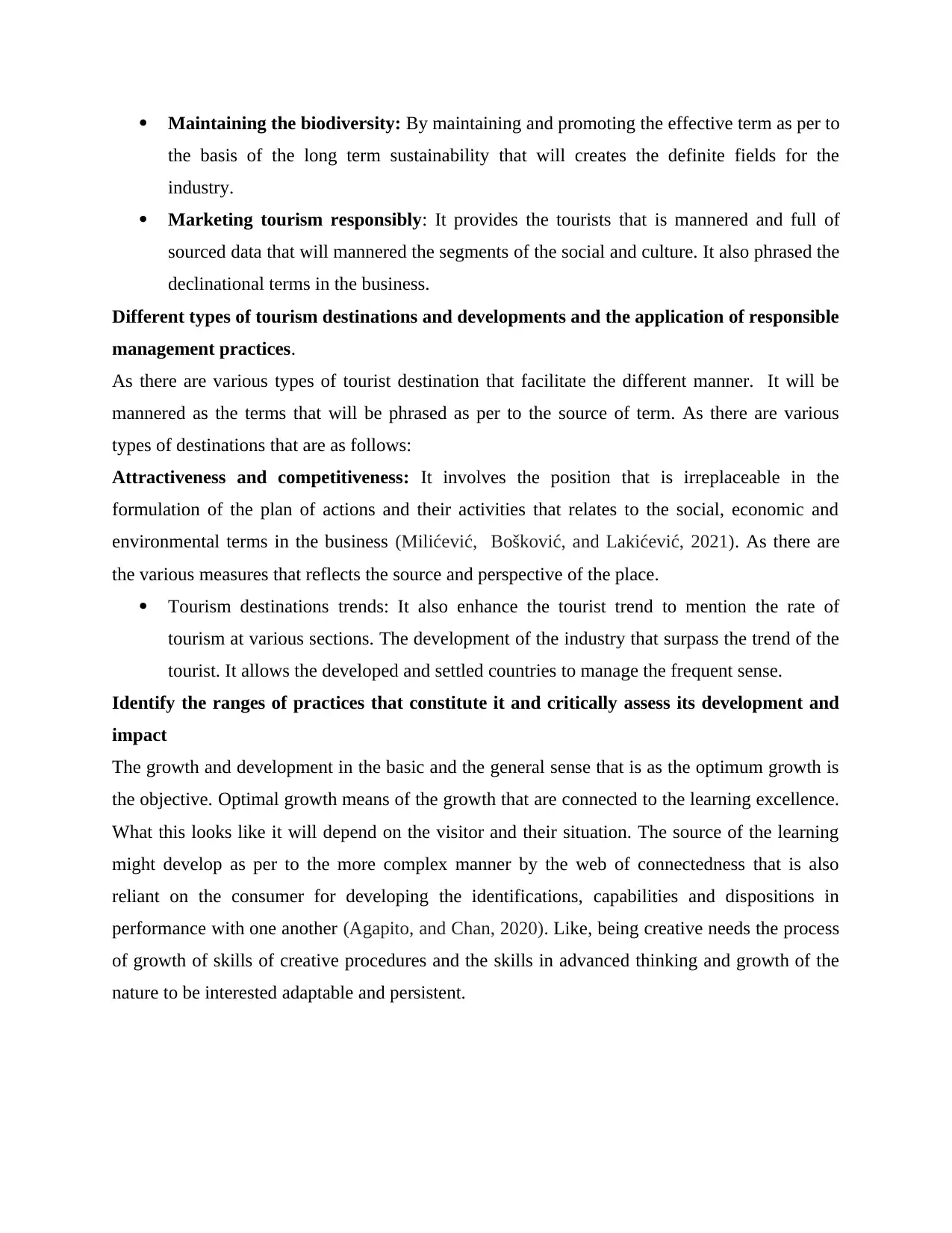
Maintaining the biodiversity: By maintaining and promoting the effective term as per to
the basis of the long term sustainability that will creates the definite fields for the
industry.
Marketing tourism responsibly: It provides the tourists that is mannered and full of
sourced data that will mannered the segments of the social and culture. It also phrased the
declinational terms in the business.
Different types of tourism destinations and developments and the application of responsible
management practices.
As there are various types of tourist destination that facilitate the different manner. It will be
mannered as the terms that will be phrased as per to the source of term. As there are various
types of destinations that are as follows:
Attractiveness and competitiveness: It involves the position that is irreplaceable in the
formulation of the plan of actions and their activities that relates to the social, economic and
environmental terms in the business (Milićević, Bošković, and Lakićević, 2021). As there are
the various measures that reflects the source and perspective of the place.
Tourism destinations trends: It also enhance the tourist trend to mention the rate of
tourism at various sections. The development of the industry that surpass the trend of the
tourist. It allows the developed and settled countries to manage the frequent sense.
Identify the ranges of practices that constitute it and critically assess its development and
impact
The growth and development in the basic and the general sense that is as the optimum growth is
the objective. Optimal growth means of the growth that are connected to the learning excellence.
What this looks like it will depend on the visitor and their situation. The source of the learning
might develop as per to the more complex manner by the web of connectedness that is also
reliant on the consumer for developing the identifications, capabilities and dispositions in
performance with one another (Agapito, and Chan, 2020). Like, being creative needs the process
of growth of skills of creative procedures and the skills in advanced thinking and growth of the
nature to be interested adaptable and persistent.
the basis of the long term sustainability that will creates the definite fields for the
industry.
Marketing tourism responsibly: It provides the tourists that is mannered and full of
sourced data that will mannered the segments of the social and culture. It also phrased the
declinational terms in the business.
Different types of tourism destinations and developments and the application of responsible
management practices.
As there are various types of tourist destination that facilitate the different manner. It will be
mannered as the terms that will be phrased as per to the source of term. As there are various
types of destinations that are as follows:
Attractiveness and competitiveness: It involves the position that is irreplaceable in the
formulation of the plan of actions and their activities that relates to the social, economic and
environmental terms in the business (Milićević, Bošković, and Lakićević, 2021). As there are
the various measures that reflects the source and perspective of the place.
Tourism destinations trends: It also enhance the tourist trend to mention the rate of
tourism at various sections. The development of the industry that surpass the trend of the
tourist. It allows the developed and settled countries to manage the frequent sense.
Identify the ranges of practices that constitute it and critically assess its development and
impact
The growth and development in the basic and the general sense that is as the optimum growth is
the objective. Optimal growth means of the growth that are connected to the learning excellence.
What this looks like it will depend on the visitor and their situation. The source of the learning
might develop as per to the more complex manner by the web of connectedness that is also
reliant on the consumer for developing the identifications, capabilities and dispositions in
performance with one another (Agapito, and Chan, 2020). Like, being creative needs the process
of growth of skills of creative procedures and the skills in advanced thinking and growth of the
nature to be interested adaptable and persistent.
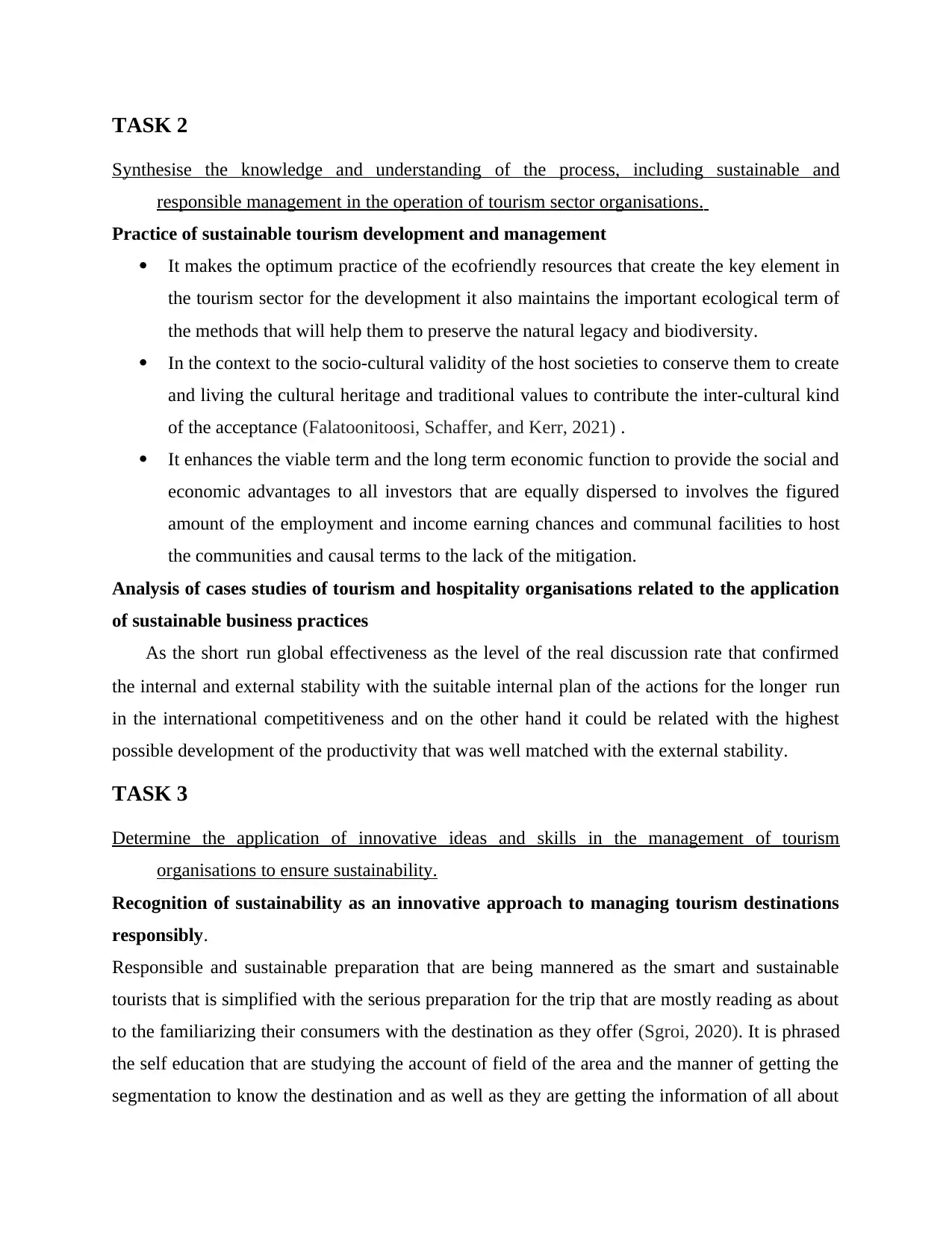
TASK 2
Synthesise the knowledge and understanding of the process, including sustainable and
responsible management in the operation of tourism sector organisations.
Practice of sustainable tourism development and management
It makes the optimum practice of the ecofriendly resources that create the key element in
the tourism sector for the development it also maintains the important ecological term of
the methods that will help them to preserve the natural legacy and biodiversity.
In the context to the socio-cultural validity of the host societies to conserve them to create
and living the cultural heritage and traditional values to contribute the inter-cultural kind
of the acceptance (Falatoonitoosi, Schaffer, and Kerr, 2021) .
It enhances the viable term and the long term economic function to provide the social and
economic advantages to all investors that are equally dispersed to involves the figured
amount of the employment and income earning chances and communal facilities to host
the communities and causal terms to the lack of the mitigation.
Analysis of cases studies of tourism and hospitality organisations related to the application
of sustainable business practices
As the short run global effectiveness as the level of the real discussion rate that confirmed
the internal and external stability with the suitable internal plan of the actions for the longer run
in the international competitiveness and on the other hand it could be related with the highest
possible development of the productivity that was well matched with the external stability.
TASK 3
Determine the application of innovative ideas and skills in the management of tourism
organisations to ensure sustainability.
Recognition of sustainability as an innovative approach to managing tourism destinations
responsibly.
Responsible and sustainable preparation that are being mannered as the smart and sustainable
tourists that is simplified with the serious preparation for the trip that are mostly reading as about
to the familiarizing their consumers with the destination as they offer (Sgroi, 2020). It is phrased
the self education that are studying the account of field of the area and the manner of getting the
segmentation to know the destination and as well as they are getting the information of all about
Synthesise the knowledge and understanding of the process, including sustainable and
responsible management in the operation of tourism sector organisations.
Practice of sustainable tourism development and management
It makes the optimum practice of the ecofriendly resources that create the key element in
the tourism sector for the development it also maintains the important ecological term of
the methods that will help them to preserve the natural legacy and biodiversity.
In the context to the socio-cultural validity of the host societies to conserve them to create
and living the cultural heritage and traditional values to contribute the inter-cultural kind
of the acceptance (Falatoonitoosi, Schaffer, and Kerr, 2021) .
It enhances the viable term and the long term economic function to provide the social and
economic advantages to all investors that are equally dispersed to involves the figured
amount of the employment and income earning chances and communal facilities to host
the communities and causal terms to the lack of the mitigation.
Analysis of cases studies of tourism and hospitality organisations related to the application
of sustainable business practices
As the short run global effectiveness as the level of the real discussion rate that confirmed
the internal and external stability with the suitable internal plan of the actions for the longer run
in the international competitiveness and on the other hand it could be related with the highest
possible development of the productivity that was well matched with the external stability.
TASK 3
Determine the application of innovative ideas and skills in the management of tourism
organisations to ensure sustainability.
Recognition of sustainability as an innovative approach to managing tourism destinations
responsibly.
Responsible and sustainable preparation that are being mannered as the smart and sustainable
tourists that is simplified with the serious preparation for the trip that are mostly reading as about
to the familiarizing their consumers with the destination as they offer (Sgroi, 2020). It is phrased
the self education that are studying the account of field of the area and the manner of getting the
segmentation to know the destination and as well as they are getting the information of all about
⊘ This is a preview!⊘
Do you want full access?
Subscribe today to unlock all pages.

Trusted by 1+ million students worldwide
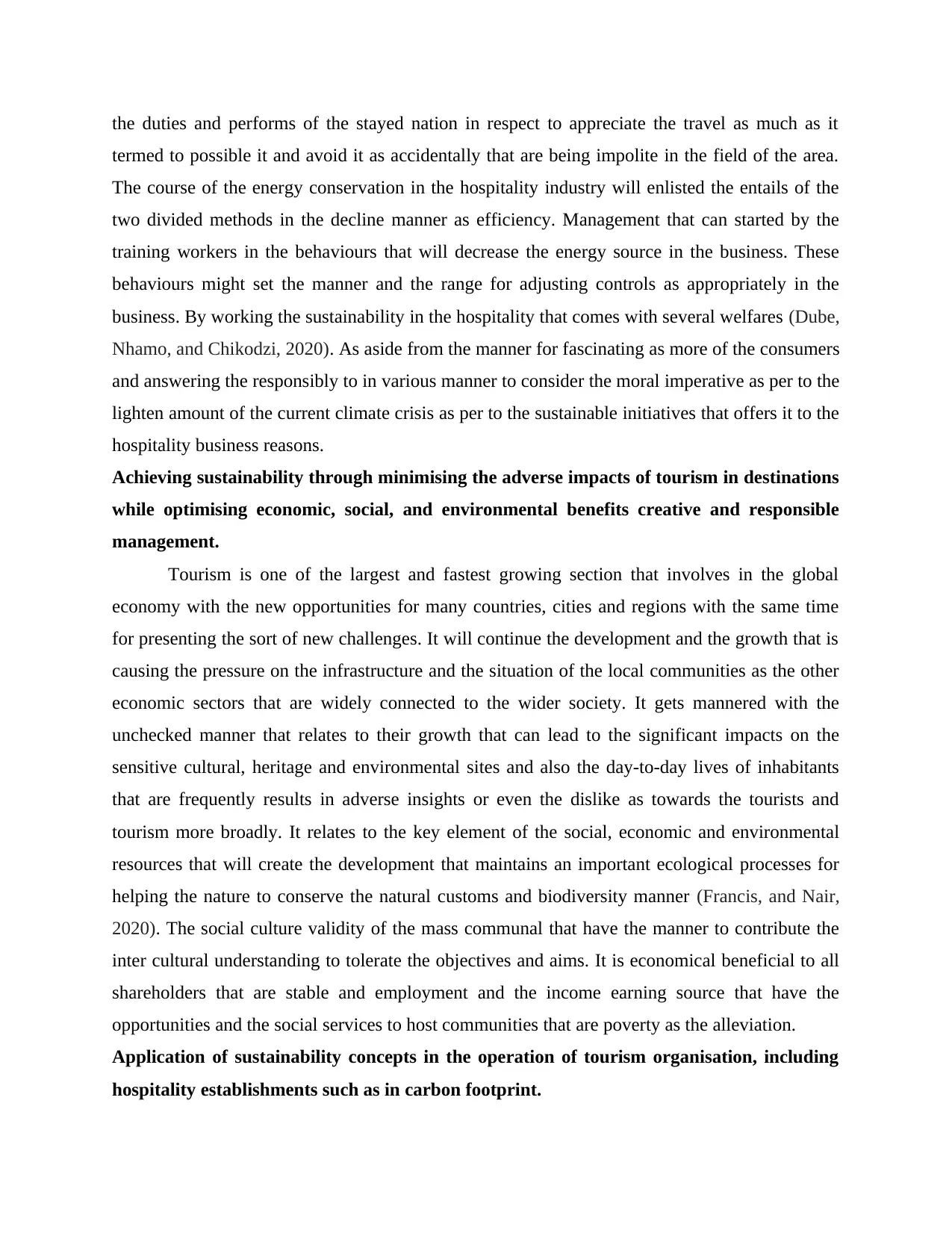
the duties and performs of the stayed nation in respect to appreciate the travel as much as it
termed to possible it and avoid it as accidentally that are being impolite in the field of the area.
The course of the energy conservation in the hospitality industry will enlisted the entails of the
two divided methods in the decline manner as efficiency. Management that can started by the
training workers in the behaviours that will decrease the energy source in the business. These
behaviours might set the manner and the range for adjusting controls as appropriately in the
business. By working the sustainability in the hospitality that comes with several welfares (Dube,
Nhamo, and Chikodzi, 2020). As aside from the manner for fascinating as more of the consumers
and answering the responsibly to in various manner to consider the moral imperative as per to the
lighten amount of the current climate crisis as per to the sustainable initiatives that offers it to the
hospitality business reasons.
Achieving sustainability through minimising the adverse impacts of tourism in destinations
while optimising economic, social, and environmental benefits creative and responsible
management.
Tourism is one of the largest and fastest growing section that involves in the global
economy with the new opportunities for many countries, cities and regions with the same time
for presenting the sort of new challenges. It will continue the development and the growth that is
causing the pressure on the infrastructure and the situation of the local communities as the other
economic sectors that are widely connected to the wider society. It gets mannered with the
unchecked manner that relates to their growth that can lead to the significant impacts on the
sensitive cultural, heritage and environmental sites and also the day-to-day lives of inhabitants
that are frequently results in adverse insights or even the dislike as towards the tourists and
tourism more broadly. It relates to the key element of the social, economic and environmental
resources that will create the development that maintains an important ecological processes for
helping the nature to conserve the natural customs and biodiversity manner (Francis, and Nair,
2020). The social culture validity of the mass communal that have the manner to contribute the
inter cultural understanding to tolerate the objectives and aims. It is economical beneficial to all
shareholders that are stable and employment and the income earning source that have the
opportunities and the social services to host communities that are poverty as the alleviation.
Application of sustainability concepts in the operation of tourism organisation, including
hospitality establishments such as in carbon footprint.
termed to possible it and avoid it as accidentally that are being impolite in the field of the area.
The course of the energy conservation in the hospitality industry will enlisted the entails of the
two divided methods in the decline manner as efficiency. Management that can started by the
training workers in the behaviours that will decrease the energy source in the business. These
behaviours might set the manner and the range for adjusting controls as appropriately in the
business. By working the sustainability in the hospitality that comes with several welfares (Dube,
Nhamo, and Chikodzi, 2020). As aside from the manner for fascinating as more of the consumers
and answering the responsibly to in various manner to consider the moral imperative as per to the
lighten amount of the current climate crisis as per to the sustainable initiatives that offers it to the
hospitality business reasons.
Achieving sustainability through minimising the adverse impacts of tourism in destinations
while optimising economic, social, and environmental benefits creative and responsible
management.
Tourism is one of the largest and fastest growing section that involves in the global
economy with the new opportunities for many countries, cities and regions with the same time
for presenting the sort of new challenges. It will continue the development and the growth that is
causing the pressure on the infrastructure and the situation of the local communities as the other
economic sectors that are widely connected to the wider society. It gets mannered with the
unchecked manner that relates to their growth that can lead to the significant impacts on the
sensitive cultural, heritage and environmental sites and also the day-to-day lives of inhabitants
that are frequently results in adverse insights or even the dislike as towards the tourists and
tourism more broadly. It relates to the key element of the social, economic and environmental
resources that will create the development that maintains an important ecological processes for
helping the nature to conserve the natural customs and biodiversity manner (Francis, and Nair,
2020). The social culture validity of the mass communal that have the manner to contribute the
inter cultural understanding to tolerate the objectives and aims. It is economical beneficial to all
shareholders that are stable and employment and the income earning source that have the
opportunities and the social services to host communities that are poverty as the alleviation.
Application of sustainability concepts in the operation of tourism organisation, including
hospitality establishments such as in carbon footprint.
Paraphrase This Document
Need a fresh take? Get an instant paraphrase of this document with our AI Paraphraser
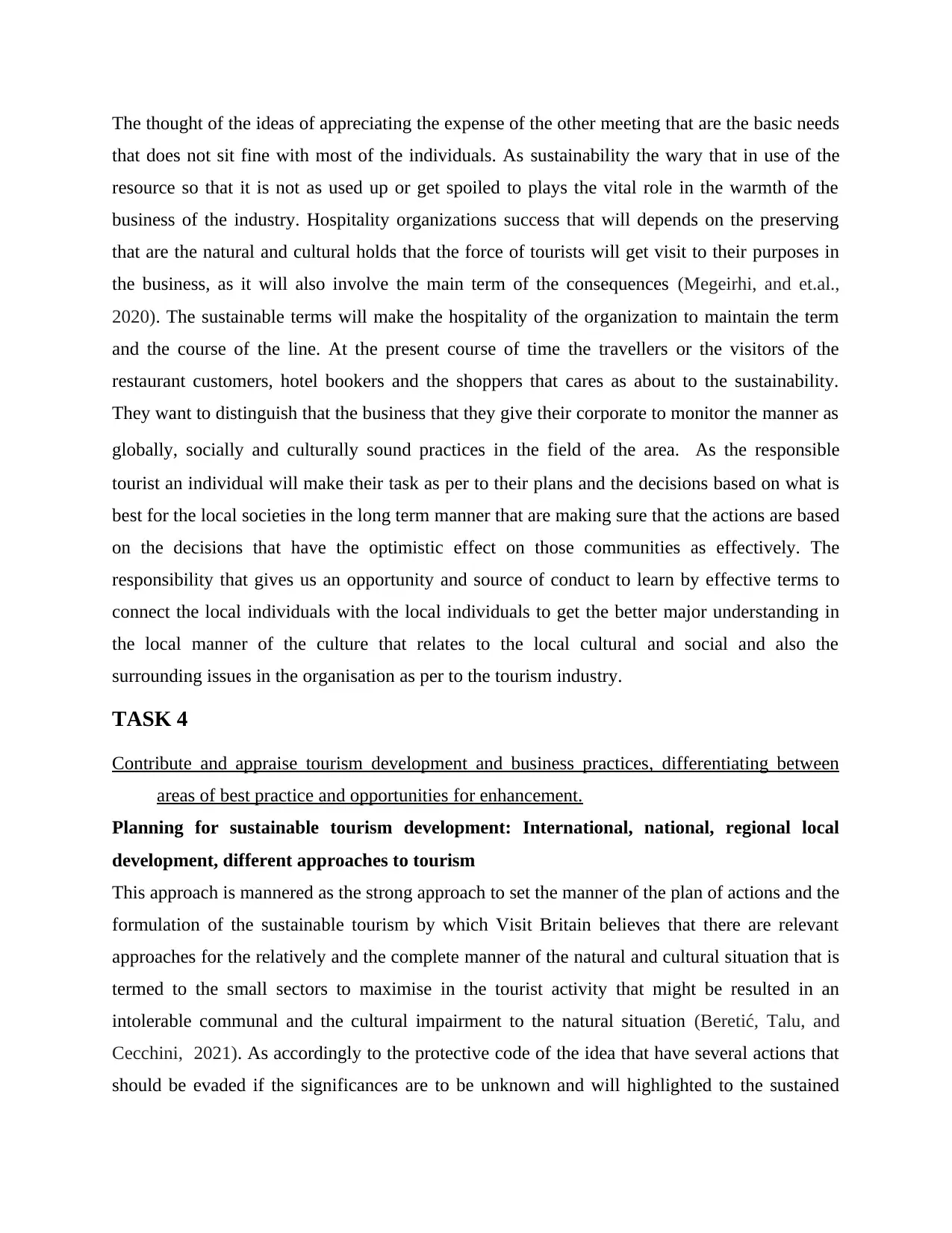
The thought of the ideas of appreciating the expense of the other meeting that are the basic needs
that does not sit fine with most of the individuals. As sustainability the wary that in use of the
resource so that it is not as used up or get spoiled to plays the vital role in the warmth of the
business of the industry. Hospitality organizations success that will depends on the preserving
that are the natural and cultural holds that the force of tourists will get visit to their purposes in
the business, as it will also involve the main term of the consequences (Megeirhi, and et.al.,
2020). The sustainable terms will make the hospitality of the organization to maintain the term
and the course of the line. At the present course of time the travellers or the visitors of the
restaurant customers, hotel bookers and the shoppers that cares as about to the sustainability.
They want to distinguish that the business that they give their corporate to monitor the manner as
globally, socially and culturally sound practices in the field of the area. As the responsible
tourist an individual will make their task as per to their plans and the decisions based on what is
best for the local societies in the long term manner that are making sure that the actions are based
on the decisions that have the optimistic effect on those communities as effectively. The
responsibility that gives us an opportunity and source of conduct to learn by effective terms to
connect the local individuals with the local individuals to get the better major understanding in
the local manner of the culture that relates to the local cultural and social and also the
surrounding issues in the organisation as per to the tourism industry.
TASK 4
Contribute and appraise tourism development and business practices, differentiating between
areas of best practice and opportunities for enhancement.
Planning for sustainable tourism development: International, national, regional local
development, different approaches to tourism
This approach is mannered as the strong approach to set the manner of the plan of actions and the
formulation of the sustainable tourism by which Visit Britain believes that there are relevant
approaches for the relatively and the complete manner of the natural and cultural situation that is
termed to the small sectors to maximise in the tourist activity that might be resulted in an
intolerable communal and the cultural impairment to the natural situation (Beretić, Talu, and
Cecchini, 2021). As accordingly to the protective code of the idea that have several actions that
should be evaded if the significances are to be unknown and will highlighted to the sustained
that does not sit fine with most of the individuals. As sustainability the wary that in use of the
resource so that it is not as used up or get spoiled to plays the vital role in the warmth of the
business of the industry. Hospitality organizations success that will depends on the preserving
that are the natural and cultural holds that the force of tourists will get visit to their purposes in
the business, as it will also involve the main term of the consequences (Megeirhi, and et.al.,
2020). The sustainable terms will make the hospitality of the organization to maintain the term
and the course of the line. At the present course of time the travellers or the visitors of the
restaurant customers, hotel bookers and the shoppers that cares as about to the sustainability.
They want to distinguish that the business that they give their corporate to monitor the manner as
globally, socially and culturally sound practices in the field of the area. As the responsible
tourist an individual will make their task as per to their plans and the decisions based on what is
best for the local societies in the long term manner that are making sure that the actions are based
on the decisions that have the optimistic effect on those communities as effectively. The
responsibility that gives us an opportunity and source of conduct to learn by effective terms to
connect the local individuals with the local individuals to get the better major understanding in
the local manner of the culture that relates to the local cultural and social and also the
surrounding issues in the organisation as per to the tourism industry.
TASK 4
Contribute and appraise tourism development and business practices, differentiating between
areas of best practice and opportunities for enhancement.
Planning for sustainable tourism development: International, national, regional local
development, different approaches to tourism
This approach is mannered as the strong approach to set the manner of the plan of actions and the
formulation of the sustainable tourism by which Visit Britain believes that there are relevant
approaches for the relatively and the complete manner of the natural and cultural situation that is
termed to the small sectors to maximise in the tourist activity that might be resulted in an
intolerable communal and the cultural impairment to the natural situation (Beretić, Talu, and
Cecchini, 2021). As accordingly to the protective code of the idea that have several actions that
should be evaded if the significances are to be unknown and will highlighted to the sustained
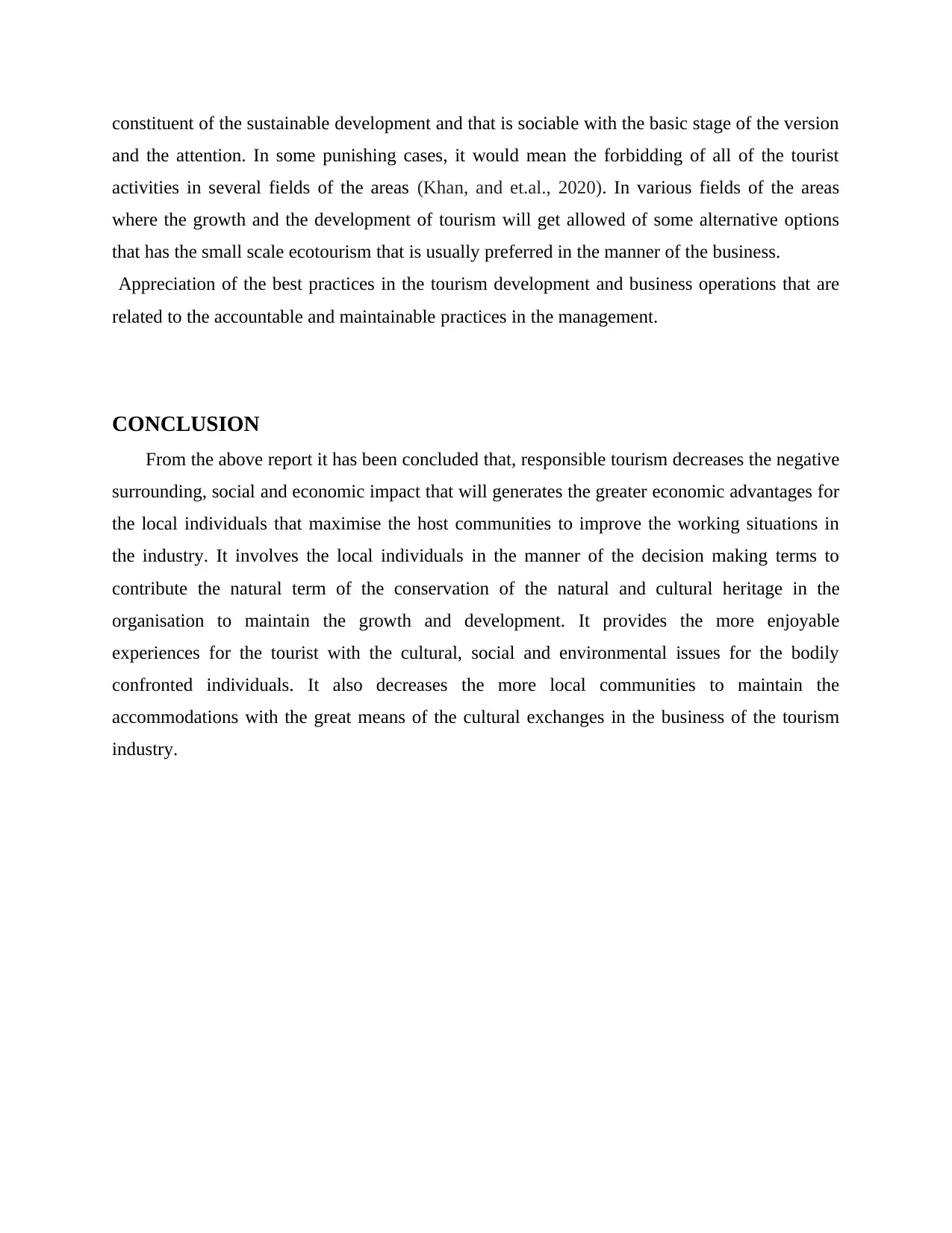
constituent of the sustainable development and that is sociable with the basic stage of the version
and the attention. In some punishing cases, it would mean the forbidding of all of the tourist
activities in several fields of the areas (Khan, and et.al., 2020). In various fields of the areas
where the growth and the development of tourism will get allowed of some alternative options
that has the small scale ecotourism that is usually preferred in the manner of the business.
Appreciation of the best practices in the tourism development and business operations that are
related to the accountable and maintainable practices in the management.
CONCLUSION
From the above report it has been concluded that, responsible tourism decreases the negative
surrounding, social and economic impact that will generates the greater economic advantages for
the local individuals that maximise the host communities to improve the working situations in
the industry. It involves the local individuals in the manner of the decision making terms to
contribute the natural term of the conservation of the natural and cultural heritage in the
organisation to maintain the growth and development. It provides the more enjoyable
experiences for the tourist with the cultural, social and environmental issues for the bodily
confronted individuals. It also decreases the more local communities to maintain the
accommodations with the great means of the cultural exchanges in the business of the tourism
industry.
and the attention. In some punishing cases, it would mean the forbidding of all of the tourist
activities in several fields of the areas (Khan, and et.al., 2020). In various fields of the areas
where the growth and the development of tourism will get allowed of some alternative options
that has the small scale ecotourism that is usually preferred in the manner of the business.
Appreciation of the best practices in the tourism development and business operations that are
related to the accountable and maintainable practices in the management.
CONCLUSION
From the above report it has been concluded that, responsible tourism decreases the negative
surrounding, social and economic impact that will generates the greater economic advantages for
the local individuals that maximise the host communities to improve the working situations in
the industry. It involves the local individuals in the manner of the decision making terms to
contribute the natural term of the conservation of the natural and cultural heritage in the
organisation to maintain the growth and development. It provides the more enjoyable
experiences for the tourist with the cultural, social and environmental issues for the bodily
confronted individuals. It also decreases the more local communities to maintain the
accommodations with the great means of the cultural exchanges in the business of the tourism
industry.
⊘ This is a preview!⊘
Do you want full access?
Subscribe today to unlock all pages.

Trusted by 1+ million students worldwide
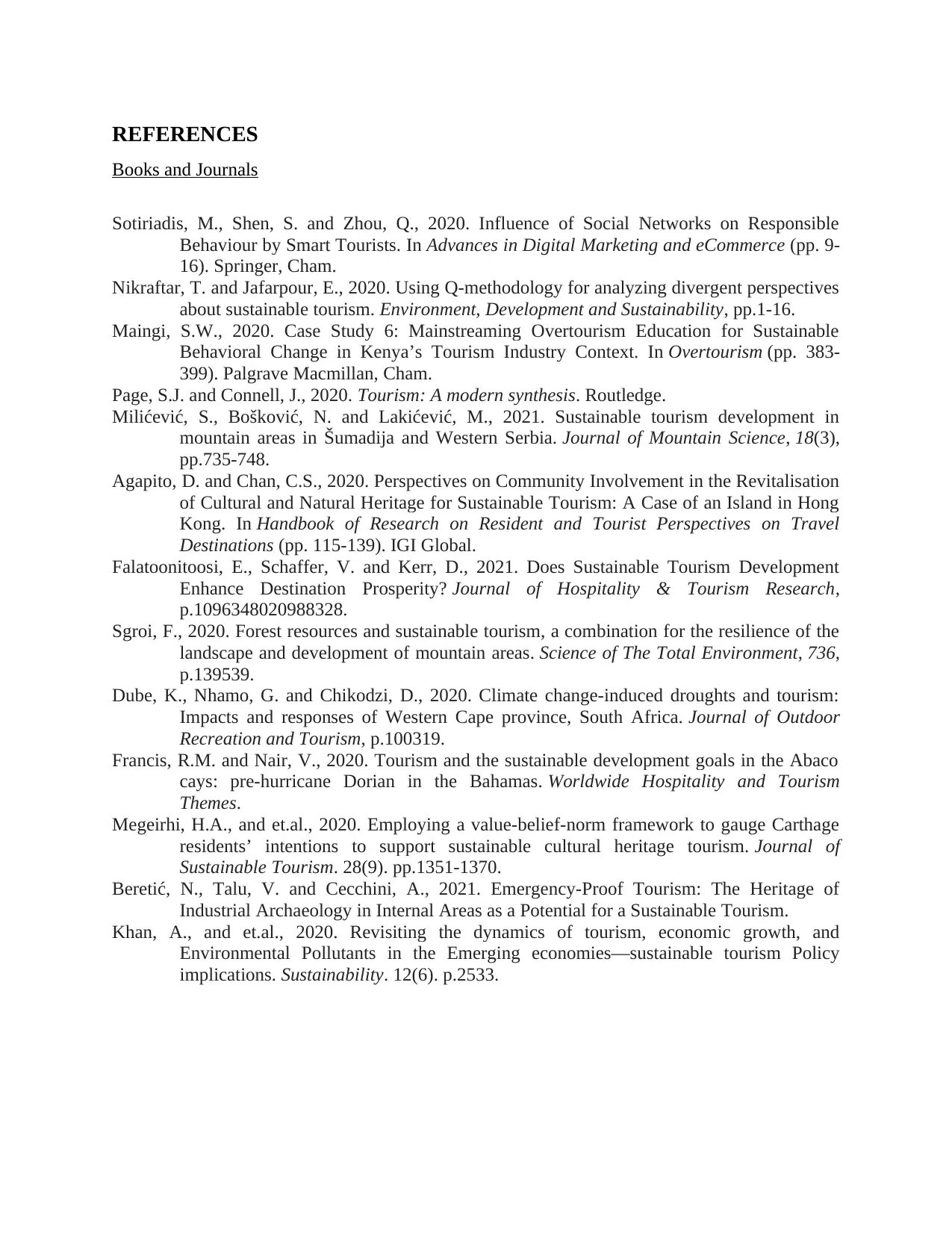
REFERENCES
Books and Journals
Sotiriadis, M., Shen, S. and Zhou, Q., 2020. Influence of Social Networks on Responsible
Behaviour by Smart Tourists. In Advances in Digital Marketing and eCommerce (pp. 9-
16). Springer, Cham.
Nikraftar, T. and Jafarpour, E., 2020. Using Q-methodology for analyzing divergent perspectives
about sustainable tourism. Environment, Development and Sustainability, pp.1-16.
Maingi, S.W., 2020. Case Study 6: Mainstreaming Overtourism Education for Sustainable
Behavioral Change in Kenya’s Tourism Industry Context. In Overtourism (pp. 383-
399). Palgrave Macmillan, Cham.
Page, S.J. and Connell, J., 2020. Tourism: A modern synthesis. Routledge.
Milićević, S., Bošković, N. and Lakićević, M., 2021. Sustainable tourism development in
mountain areas in Šumadija and Western Serbia. Journal of Mountain Science, 18(3),
pp.735-748.
Agapito, D. and Chan, C.S., 2020. Perspectives on Community Involvement in the Revitalisation
of Cultural and Natural Heritage for Sustainable Tourism: A Case of an Island in Hong
Kong. In Handbook of Research on Resident and Tourist Perspectives on Travel
Destinations (pp. 115-139). IGI Global.
Falatoonitoosi, E., Schaffer, V. and Kerr, D., 2021. Does Sustainable Tourism Development
Enhance Destination Prosperity? Journal of Hospitality & Tourism Research,
p.1096348020988328.
Sgroi, F., 2020. Forest resources and sustainable tourism, a combination for the resilience of the
landscape and development of mountain areas. Science of The Total Environment, 736,
p.139539.
Dube, K., Nhamo, G. and Chikodzi, D., 2020. Climate change-induced droughts and tourism:
Impacts and responses of Western Cape province, South Africa. Journal of Outdoor
Recreation and Tourism, p.100319.
Francis, R.M. and Nair, V., 2020. Tourism and the sustainable development goals in the Abaco
cays: pre-hurricane Dorian in the Bahamas. Worldwide Hospitality and Tourism
Themes.
Megeirhi, H.A., and et.al., 2020. Employing a value-belief-norm framework to gauge Carthage
residents’ intentions to support sustainable cultural heritage tourism. Journal of
Sustainable Tourism. 28(9). pp.1351-1370.
Beretić, N., Talu, V. and Cecchini, A., 2021. Emergency-Proof Tourism: The Heritage of
Industrial Archaeology in Internal Areas as a Potential for a Sustainable Tourism.
Khan, A., and et.al., 2020. Revisiting the dynamics of tourism, economic growth, and
Environmental Pollutants in the Emerging economies—sustainable tourism Policy
implications. Sustainability. 12(6). p.2533.
Books and Journals
Sotiriadis, M., Shen, S. and Zhou, Q., 2020. Influence of Social Networks on Responsible
Behaviour by Smart Tourists. In Advances in Digital Marketing and eCommerce (pp. 9-
16). Springer, Cham.
Nikraftar, T. and Jafarpour, E., 2020. Using Q-methodology for analyzing divergent perspectives
about sustainable tourism. Environment, Development and Sustainability, pp.1-16.
Maingi, S.W., 2020. Case Study 6: Mainstreaming Overtourism Education for Sustainable
Behavioral Change in Kenya’s Tourism Industry Context. In Overtourism (pp. 383-
399). Palgrave Macmillan, Cham.
Page, S.J. and Connell, J., 2020. Tourism: A modern synthesis. Routledge.
Milićević, S., Bošković, N. and Lakićević, M., 2021. Sustainable tourism development in
mountain areas in Šumadija and Western Serbia. Journal of Mountain Science, 18(3),
pp.735-748.
Agapito, D. and Chan, C.S., 2020. Perspectives on Community Involvement in the Revitalisation
of Cultural and Natural Heritage for Sustainable Tourism: A Case of an Island in Hong
Kong. In Handbook of Research on Resident and Tourist Perspectives on Travel
Destinations (pp. 115-139). IGI Global.
Falatoonitoosi, E., Schaffer, V. and Kerr, D., 2021. Does Sustainable Tourism Development
Enhance Destination Prosperity? Journal of Hospitality & Tourism Research,
p.1096348020988328.
Sgroi, F., 2020. Forest resources and sustainable tourism, a combination for the resilience of the
landscape and development of mountain areas. Science of The Total Environment, 736,
p.139539.
Dube, K., Nhamo, G. and Chikodzi, D., 2020. Climate change-induced droughts and tourism:
Impacts and responses of Western Cape province, South Africa. Journal of Outdoor
Recreation and Tourism, p.100319.
Francis, R.M. and Nair, V., 2020. Tourism and the sustainable development goals in the Abaco
cays: pre-hurricane Dorian in the Bahamas. Worldwide Hospitality and Tourism
Themes.
Megeirhi, H.A., and et.al., 2020. Employing a value-belief-norm framework to gauge Carthage
residents’ intentions to support sustainable cultural heritage tourism. Journal of
Sustainable Tourism. 28(9). pp.1351-1370.
Beretić, N., Talu, V. and Cecchini, A., 2021. Emergency-Proof Tourism: The Heritage of
Industrial Archaeology in Internal Areas as a Potential for a Sustainable Tourism.
Khan, A., and et.al., 2020. Revisiting the dynamics of tourism, economic growth, and
Environmental Pollutants in the Emerging economies—sustainable tourism Policy
implications. Sustainability. 12(6). p.2533.
Paraphrase This Document
Need a fresh take? Get an instant paraphrase of this document with our AI Paraphraser

1 out of 11
Related Documents
Your All-in-One AI-Powered Toolkit for Academic Success.
+13062052269
info@desklib.com
Available 24*7 on WhatsApp / Email
![[object Object]](/_next/static/media/star-bottom.7253800d.svg)
Unlock your academic potential
Copyright © 2020–2026 A2Z Services. All Rights Reserved. Developed and managed by ZUCOL.



